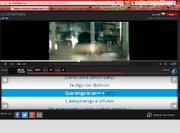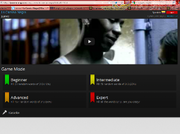Music is a valuable tool that shouldn't be ignored. Even for a complete beginner, it's a good way to get used to the sound of the language and practise the pronunciation. In fact, that's perhaps the easiest way to use native materials as a beginner - but be sure to listen to ordinary speech as well! However, even advanced learners can get a lot out of music.
See also: general ideas for improving your listening comprehension, the Music Challenge
Using the lyrics[]
Nowadays it's very easy to find most lyrics online. There are also many online translations, though they are often inaccurate or poetic so don't be frustrated if something doesn't make sense. Ask a native speaker or just let it be; it's very likely that as you make progress you'll understand it better.
Be sure to vary your usage of the lyrics. At least with some songs, try not looking at the lyrics until you're absolutely certain you can't figure out more. You may also want to read the lyrics first, and then listen to the song without looking at them.
When you know the song well, you can use techniques like intensive reading or scriptorium to pay attention to all the details. You can also add some of the lines to your SRS. A song that you love enough to study it like that is an incredible resource, especially for beginners.
Different versions[]
Sometimes not understanding doesn't mean you're not trying hard enough. Perhaps the singer simply sang a specific part in a weird/unusual way or just unclearly. Native speakers frequently fill in these gaps by using the context and their knowledge of collocations. In this case, a different version of the song can help: look for live recordings on youtube, listen to an "unplugged" or cover version. Many classic hits have been performed by various artists, with completely different voices.
Lyricstraining site[]
Lyricstraining.com is a site where you can listen to songs while filling the gaps in the lyrics or typing the whole lyrics. It stops when you are having trouble and accepts only correct answers. Diacritics are not needed, and normally you also don't have to type the unclear lines sung or spoken in the background, as the parts in brackets don't count (see the screenshot below).
Languages - official and unofficial[]
Lyricstraining has a great selection of music, and it is a good way to start exploring music of your target language.

Lyricstraining.com - new version
The site currently supports songs in English, Spanish, German, French, Portuguese, Italian, Catalan, Turkish, Japanese (romaji), Finnish, Polish and Dutch. HTLAL member YnEoS has uploaded some songs in Hungarian and Russian; there is also at least one known song in Galician. (TBC)
Notes:
- If you're aware of more songs in the languages that aren't officially supported, please add a link above and/or post about them on the forum.
- All "official" songs are marked as a particular variant of the language, using flags: for example, Portugal and Brazil for Portuguese; Spain, Mexico, Argentina and others for Spanish. This doesn't necessarily mean that the song contains regionalisms or non-standard pronunciation.
- The songs in Cyrillics only work in the karaoke mode. Presumably this applies to other non-Latin scripts as well.
Modes and options[]
Songs are classified according to their difficulty (easy, medium, hard), which doesn't correlate to the length of the song or the uncommon vocabulary. Usually it has to do with the pace of the song.
There are five modes of using the site:

- karaoke (at the bottom): just reading the synced lyrics, no points to be gained
- beginner: 10% of the lyrics are hidden
- intermediate: 25% hidden
- advanced: 50% hidden
- expert: typing the whole text
New version (2014)[]
A new version of lyricstraining.com was released in February 2014. More changes may be coming.
- The scores have been reset, and as of now your totals are no longer tracked.
- An advanced mode (50% of the text hidden) has been added as an option between intermediate (25% hidden) and expert (typing the whole text).
- While choosing the mode, you can now see how long the song is and how many words you'll have to type.
- Like in karaoke, each line is now gradually highlighted as it is played (in any mode, see the image above).
- The whole experience is more game-like, and if you wait for too long, your "life" will be lost and you'll need to start from the beginning. There's also a practise mode in which there are no limits but the points don't count either.
- When viewing the high scores, it's now possible to compare yourself to other users from your country (including both registered and guests),
Mental practice[]
When you have no opportunity to study your target language, you can still sing in it silently. Of course you can't learn much this way, though you may finally figure out what a specific line means. Even if you don't get an epiphany moment, it will at least keep the language "buzzing" in your head.
In order to be humming it to yourself all day, you may want to listen to a catchy song in your L2 in the morning (such as "Ai se eu te pego" or "Gangnam style").
Challenges and music[]
Starting from 2015, a challenge dedicated to music was started.
Other challenges handle music in various ways:
- Tadoku ("read more or die") has a #lyric tag, which equals one page. You can count even the songs you know well, as long as you've not read the lyrics before (or adjust the repeat count accordingly)
- TAC allows music and there are often team challenges about it
- The 6 week challenge allows music, however, there's peer pressure for counting only a fraction of the time spent, unless you're very actively involved, for example reading the lyrics, singing along or using the Lyricstraining site
- The learning-based challenge and various small challenges allow music
- The Super Challenge doesn't allow music
Finding music sung in your target language[]
A huge help here is youtube. Sometimes even looking for something like "en español" can help but the best is to find at least one artist to begin with and let the current of links and suggestions drag you to more. You can, of course, use google and wikipedia as well but youtube is probably the most comfortable way as you can try a song or two by the musician or band right away. If available, Spotify is also a great option, especially for finding music by using a smartphone/tablet.
If you wish suggestions on where to start, see ourlist of music sorted by target language
Another starting point may be the youtube mixes. Just go to youtube and search "Canzoni italiane" or anything like that and you should get several playlists of various genres. Be prepared that music chosen included in the first few ones may not be to your liking as your search is too general. Or you may already know an artist and look at the similar ones youtube offers you. Or you know a genre is popular in the country and you search "Swedish metal".
Another option is to search the program of music festivals or cultural overview of all that happens in a city. Some digging in the results of googling "concerts grenoble octobre" or "this or that spanish festival you heard about" will surely show some local artists.
A great thing you can do these days is listening to foreign radio stations through the means of the internet. Search in your browser or get some of the many radio apps available for tablets and smartphones.
Further reading[]
Consider getting the book "Language is music", which was written by Susanna Zaraysky, who's a polyglot and musician. Contrary to what the name might suggest, it isn't solely about using music in your learning.